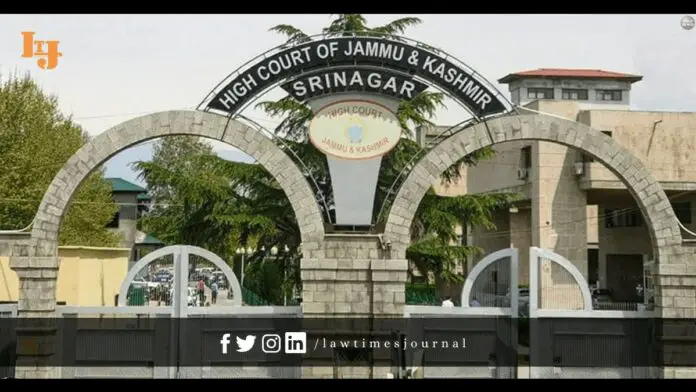
The Jammu and Kashmir and Ladakh High Court has dismissed a petition seeking the reopening of Jammu and Kashmir’s State Human Rights Commission, Women Commission, and Accountability Commission to hear pending grievances. The Court found that the petition was politically motivated and that it was aimed at the government for violating Article 370.
“The averments given in the petition suggest that the petitioner is not really interested in the formation of the above foras, but rather in attacking the government over the removal of the special status provided to J&K,” a Bench of Chief Justice Pankaj Mittal and Justice Rajnesh Oswal noted.
It was added “He has accused the government of increasing army brutality in the Union Territory, the application of draconian laws, the rise of the unknown gunman culture in the Union Territory since the repeal of Article 370, the transformation of Kashmir into a full-fledged war zone, and significant youth unrest in the Union Territory following the repeal of Article 370”.
The Bench slapped a nominal fee of Rs. 10,000 on the Petitioner, noting that such allegations embarrass the court. “All of the aforesaid facts are very critical of the government in the way described as if the petitioner is not before a legal forum but rather a political platform. By alleging the aforesaid allegations, the petitioner is attempting to scandalise the court in order to get political mileage “The Court stated.
Nikhil Padha, posing as a law student, petitioned the court to reopen cases before the State Human Rights Commission, Women Commission, and Accountability Commission. According to the plea, there are 765 instances pending before the SHRC alone in these commissions, with 267 of them involving military, paramilitary, and police personnel.
The institutions listed above, according to the petition, have been closed since Article 370 was repealed.
The Court noted that the language employed in the petition appears to have been written on behalf of more than one individual, as the only petitioner is referred to as Petitioner 1 and plural forms are used to refer to the petitioner. After noting this, the Court noted that the Petition was originally written on behalf of more than one person, but that the names of the other petitioners were abruptly erased for unknown reasons.
The petitioner claimed to be a recent Jammu University law graduate, whom the Court commented, “We don’t see how a law student or someone who just graduated from law school can be considered a passionate human rights fighter, as the petitioner claims. Despite his young age, the petitioner has not mentioned any of his activities that could indicate that he is actively involved in the protection of citizens’ human rights or that he is a well-known human rights activist.”
As a result, the Court concluded that the petitioner is not a genuine person and has been used as a proxy by someone else to bring this lawsuit in the public interest.
It was also remarked that the petitioner’s behaviour throughout the presentation of the case suggested that he had been put up politically to bring up worldwide issues of human rights breaches unnecessarily.
It went on to say that the petitioner’s allegations show that the petitioner is only interested in attacking the government over the removal of the special status provided to J&K, not on establishing the aforesaid foras.
It declared, “He has accused the government of increasing army brutality in the Union Territory, the application of draconian laws, the rise of the unknown gunman culture in the Union Territory since the repeal of Article 370, the transformation of Kashmir into a full-fledged war zone, and significant youth unrest in the Union Territory following the repeal of Article 370. He also mentioned the Gupkar Alliance’s strong win in the previous DDC elections.”
In Seema Upadhyay v. Union of India (2018), the Court stated that a “PIL is not a Pill for every sickness” and that it should not be considered if the persons’ bona fides are in question.
The Court cited Manohar Lal Sharma v. Sanjay Leela Bhansali (2018) as authority for the proposition that a PIL cannot be allowed to be filed in order to circumvent the legal system or if the pleadings are vexatious, misconceived, baseless, and untenable.
The Supreme Court, reiterating the principle established by the Supreme Court in Vishwanath Chaturvedi v. Union of India (2007), stated that when a political party or individual files a complaint against another political party or individual, it is not bona fide litigation at the request of the opponent, and that such petitions in the public interest should not be entertained. In response to the petitioner’s request for mandamus, the Court stated that the petitioner should have first addressed the appropriate authorities to resolve his problems, and then, if there was still a grievance, claimed the High Court’s extraordinary discretionary jurisdiction.
“It may be worth noting that of the complainants of the on-going cases have ever addressed this Court for the adjudication of their claims pending before the J&K Human Rights Commission, which has been wound up,” the Court said of pending complaints before the wound up State Human Rights Commission. The Court, on the other hand, stated that the State-respondents must take appropriate actions to revive the above institutions as soon as possible.








